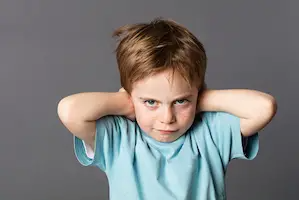


 12:44:6
12:44:6  2025-02-03
2025-02-03  1136
1136

(I don’t understand why there should be no punishment for transgressions… What if a child really crosses the line? Yesterday my three-year-old threw a book because he was angry. It hit my husband in the eye and cut his skin—my God! I took him out of the room, told him that was never right, and put him in the thinking corner. Yes? No?)
—Jamie Lynn, mom of two children ages 3 and 5
Oh my God! Most three-year-olds try to throw things, with no idea how much damage they can do.
The problem with banishing a child to the thinking corner and leaving him alone is that it doesn’t help him deal with the feelings that led him to throw the book in the first place. Behind aggressive behavior is always fear—and every little person has fears we can’t even imagine. A three-year-old is likely to lash out in his fear and rage at something, throwing everything in his reach. This is normal behavior, though it can be dangerous, of course, as this child has learned, and of course we tell him that throwing things at people is not right, just as these parents did. But this child now knows (for sure after hurting his father) that throwing hurts. What he needs is help from his parents to manage the feelings that led him to throw.
I wonder what went on inside this three-year-old once he got to the thinking corner. If I were him, I would be terribly afraid for my father and worried that I was a terrible person capable of doing terrible harm, unable to control myself. It is so bad that I pushed away and could not even reconcile with my father. I would see myself as so strong that I could have hurt my invincible father, which is a terrifying thought. This shame and fear would be so strong that I would have pushed him away (as we all do with these unpleasant feelings) with anger. I would have sat there justifying what I did, telling myself why I was right.
As you can see, isolating this child will not help him learn to manage the emotions that led him to “cross the line.” He is so scared that he cannot think clearly and therefore cannot draw logical conclusions. Although he may follow our instructions and apologize after the timeout has passed, he will not be in a better position to manage his aggression next time or may never attack his father again, but he may start to react in other ways, such as hitting his brother, urinating all over the house, or having nightmares. What if, instead, we immediately took care of the injured person, giving the child a clear message that this injury is serious. We let him help, and perhaps focusing on his father will be enough to shift him from his anger to caring for his father. (“Oh my God, your father is hurt. Honey, go get a towel and let’s help your father.”) We invite him to join in, so that he becomes part of the solution. He may have done something brutal, but we send him the message that he is not a monster. This is the foundation that will enable him to face the fact that he made a mistake that crossed the line, and it is the foundation that will enable him to forgive himself. It starts with our forgiveness.
Have we been too forgiving? No. A child cannot feel like a bad person and still act like a decent person. He has done something that clearly falls outside the realm of loving family relationships. Instead of ostracizing him, which reinforces his status as a bad child, we rush to bring him back into the family. Without reconnecting, we cannot influence him, and any kind of “discipline” will only teach him that he is bad.
Once the afflicted parent is okay, we take a deep breath so that we do not act out of anger. We remind ourselves that the best way to prevent this from happening again is to help our child deal with his feelings, not to punish him.
We approach him with seriousness and adult kindness, look him in the eye, and say, “Books are not made to be thrown away.” That really hurt your dad, didn’t it? (Our child will probably burst into tears, letting out all the turmoil he’s feeling. We hold him when he cries. When he calms down, we say, “You were angry, so I threw the book, but that really hurt your dad. That was scary. Your dad will be okay, but that’s why you don’t throw things at people.”)
After he calms down, we ask him what he can do to make his dad feel better. We give him a chance to clear his head, to become a good person in his mind, someone who can control his anger so that he doesn’t hurt others. This transformation is unlikely to happen if he’s been banished to the thinking corner, because he’ll sit there isolated like a criminal, hardening his heart. But he participated in the emergency as a helper, so his heart opened up. He felt our kindness, and our deep-seated expectation that he would be a helpful person, not a hurtful person. He felt safe showing us all the fear behind his anger. Once he expresses all those feelings, they evaporate and stop driving his behavior.
What you know Our child?
* Throwing things can hurt people badly.
* I want to control myself better next time so that it never happens again.
* Emotions don’t have to become an emergency as long as I don’t act on them.
* My mom and dad understand my overwhelming feelings. I can trust them to help me.
* I am capable of hurting someone badly, and I don’t want to do that.
* I am capable of improving things, mending faults, and making things right when I make a mistake.
Perhaps most importantly, instead of feeling like he’s crossed a line and lost touch and lost his parents’ love, he’s learned that he’s loved unconditionally. His parents haven’t abandoned him. They know that he’s essentially good and wants to “do the right thing,” and they’ve never stopped believing in him. This belief will strengthen his belief in his own goodness and help him become trustworthy.
Because the healing miracle of unconditional love is that there are no conditions. There is nothing but love.
Reality Of Islam |
|

Researchers

A new metas

As air frye

A newly dev
 9:3:43
9:3:43
 2018-11-05
2018-11-05
10 benefits of Marriage in Islam
 7:5:22
7:5:22
 2019-04-08
2019-04-08
benefits of reciting surat yunus, hud &
 9:45:7
9:45:7
 2018-12-24
2018-12-24
advantages & disadvantages of divorce
 11:35:12
11:35:12
 2018-06-10
2018-06-10
 6:0:51
6:0:51
 2018-10-16
2018-10-16
 11:34:48
11:34:48
 2022-06-29
2022-06-29
 8:30:23
8:30:23
 2022-03-03
2022-03-03
 6:0:8
6:0:8
 2023-03-19
2023-03-19
 5:57:34
5:57:34
 2023-03-18
2023-03-18
 10:43:56
10:43:56
 2022-06-22
2022-06-22
 3:18:29
3:18:29
 2022-12-24
2022-12-24
 9:50:37
9:50:37
 2023-02-28
2023-02-28
 5:41:46
5:41:46
 2023-03-18
2023-03-18
| LATEST |